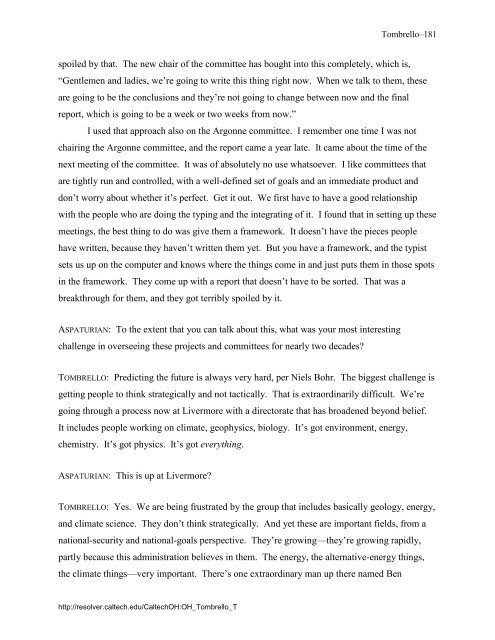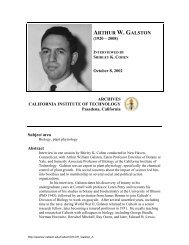Interview with Thomas A. Tombrello - Caltech Oral Histories
Interview with Thomas A. Tombrello - Caltech Oral Histories
Interview with Thomas A. Tombrello - Caltech Oral Histories
You also want an ePaper? Increase the reach of your titles
YUMPU automatically turns print PDFs into web optimized ePapers that Google loves.
<strong>Tombrello</strong>–181<br />
spoiled by that. The new chair of the committee has bought into this completely, which is,<br />
“Gentlemen and ladies, we’re going to write this thing right now. When we talk to them, these<br />
are going to be the conclusions and they’re not going to change between now and the final<br />
report, which is going to be a week or two weeks from now.”<br />
I used that approach also on the Argonne committee. I remember one time I was not<br />
chairing the Argonne committee, and the report came a year late. It came about the time of the<br />
next meeting of the committee. It was of absolutely no use whatsoever. I like committees that<br />
are tightly run and controlled, <strong>with</strong> a well-defined set of goals and an immediate product and<br />
don’t worry about whether it’s perfect. Get it out. We first have to have a good relationship<br />
<strong>with</strong> the people who are doing the typing and the integrating of it. I found that in setting up these<br />
meetings, the best thing to do was give them a framework. It doesn’t have the pieces people<br />
have written, because they haven’t written them yet. But you have a framework, and the typist<br />
sets us up on the computer and knows where the things come in and just puts them in those spots<br />
in the framework. They come up <strong>with</strong> a report that doesn’t have to be sorted. That was a<br />
breakthrough for them, and they got terribly spoiled by it.<br />
ASPATURIAN: To the extent that you can talk about this, what was your most interesting<br />
challenge in overseeing these projects and committees for nearly two decades?<br />
TOMBRELLO: Predicting the future is always very hard, per Niels Bohr. The biggest challenge is<br />
getting people to think strategically and not tactically. That is extraordinarily difficult. We’re<br />
going through a process now at Livermore <strong>with</strong> a directorate that has broadened beyond belief.<br />
It includes people working on climate, geophysics, biology. It’s got environment, energy,<br />
chemistry. It’s got physics. It’s got everything.<br />
ASPATURIAN: This is up at Livermore?<br />
TOMBRELLO: Yes. We are being frustrated by the group that includes basically geology, energy,<br />
and climate science. They don’t think strategically. And yet these are important fields, from a<br />
national-security and national-goals perspective. They’re growing—they’re growing rapidly,<br />
partly because this administration believes in them. The energy, the alternative-energy things,<br />
the climate things—very important. There’s one extraordinary man up there named Ben<br />
http://resolver.caltech.edu/<strong>Caltech</strong>OH:OH_<strong>Tombrello</strong>_T

















